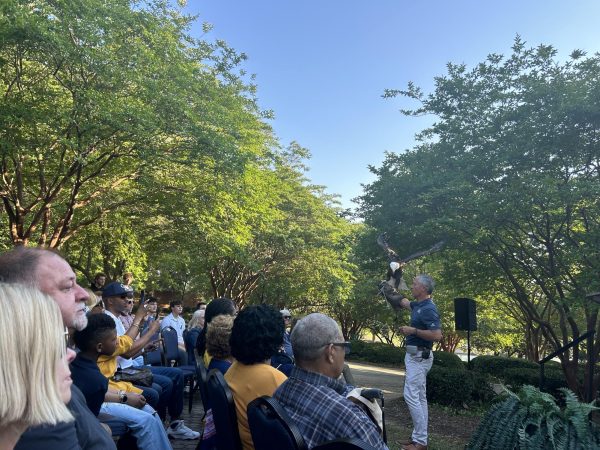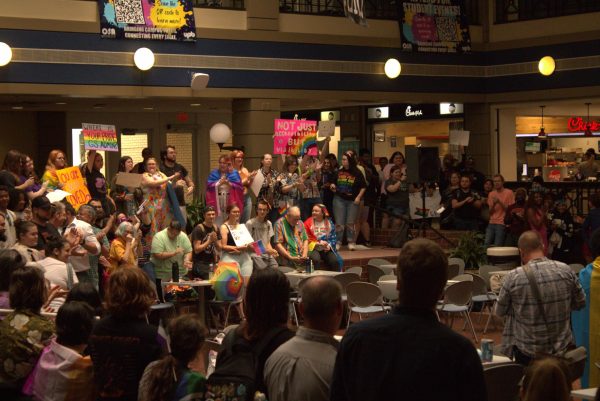Georgia Southern history department hosts lecture on book burnings
October 16, 2019
STATESBORO — The Georgia Southern University history department hosted a teach-in Tuesday night to discuss book burnings throughout world history.
Five GS history professors each gave a quick lecture on book burning in different eras in the world, from the Xin Dynasty in China to burning The Beatles albums in the 1960s. The lectures were given to a room that was at capacity with students, faculty and some of the GS administration.
After the professors were finished with relating the history to last week’s book burning through powerpoint, the floor was open for questions.
The first question asked by a student came from freshman Max Eshbaugh.
“Clearly this act of book burning is going to be associated with Georgia Southern since it’s made national news, but since obviously the actions of those few people don’t represent the feelings of everyone else that attend this university, how would you suggest that the student population and other members of this community can work towards changing how Georgia Southern is perceived?”
Brian Feltman, Ph.D, who spoke on the Nazi regime in Europe around World War II, responded by encouraging all the students to attend the SGA open forum on Wednesday night. He then spoke about the power the students have to speak out and make changes.
“I can sponsor, along with the history department, this event tonight, but I can’t encourage you all to come out and peacefully demonstrate and say this is not what our university is about,” Feltman said. “You have the ability to do exactly that.”
Another question was posed about what the administration is going to do about the students who burned books. The professors on the panel waited for the applause to die down before carefully responding.
Michelle Haberland, Ph.D used an anecdote about students at the University of California who sparked change in the 1960s to provide an example of college students having an impact.
“There’s only so much we can do as faculty,” Haberland said. “You guys can do this, it’s been done before. Mark Twain says, ‘History doesn’t actually repeat itself, but it does sometimes rhyme.’ Let’s rhyme.”
More discussion on how history can be used in 2019 to shape action occurred. New Department Chair Carol Herringer, Ph.D thanked the speakers and the audience for attending and said that the department hopes to have another teach-in on the Armstrong Campus soon.
A question on white privilege and if college students should be having these difficult conversations followed Herringer’s thanks. Feltman jumped in to respond.
“Absolutely we have to have these conversations and the university is the place where we’re supposed to have these conversations,” Feltman said. “As someone from the working class, there were certain advantages that I did not have in life, certain things I didn’t have access to. However, I don’t get pulled over because of the color of my skin. I don’t face any kind of discrimination when I go apply for a mortgage because of the color of my skin. I think it’s really important to have that conversation where people from different kinds of backgrounds can talk about different kinds of privilege and understand how they aren’t mutually exclusive.”
The following question asked for the faculty’s perception of the freshman class. Haberland and the rest of the faculty agreed that they teach all students and they didn’t think differently of this specific class.
The presence of President Kyle Marrero and Provost Carl Reiber was acknowledged by a student who asked if there will be a similar kind of Q&A with the GS administration.
“(Wednesday), we have the SGA forum and please come,” Marrero said. “I will be answering every question I possibly can.”
One of the final questions asked was about how the students who burned books aren’t being punished. The student also asked what will stop other speakers from coming to GS.
Feltman said that the students should accept responsibility before any “redemption” can be given and any speaker will think differently about the school.
Haberland gave the example of U.S. President Lyndon B. Johnson who was raised as a segregationist, but over time evolved and ended up signing two groundbreaking civil rights acts.
The event lasted nearly an hour and a half and Herringer said it was a positive sign for GS.
“It was great to show how the historical context of things matters,” she said. “It was wonderful to hear all of the student questions too.”
McClain Baxley, The George-Anne Editor-in-Chief, gaeditor@georgiasouthern.edu














